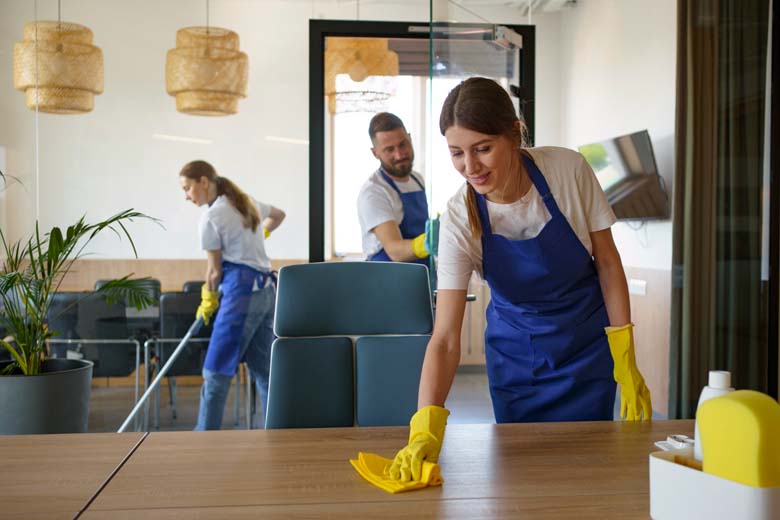- Free Estimates

Key Takeaways
Introduction
6 Benefits of Hiring Deep Cleaning Services for Commercial Spaces
Tips for Finding a Reputable Deep Cleaning Services in Danbury, CT
How Often Should Commercial Spaces Be Professionally Cleaned
10 Tips for Maintaining Cleanliness in High-Traffic Commercial Areas
Frequently Asked Questions
✔ Deep cleaning services for commercial spaces enhance hygiene, improve indoor air quality, and extend the longevity of facilities.
✔ When seeking deep cleaning services in Danbury, CT, prioritize research, referrals, and reviews to find a reputable provider.
✔ The frequency of professional cleaning for commercial spaces depends on factors like foot traffic, industry regulations, and specific cleaning needs.
✔ Maintaining cleanliness in high-traffic commercial areas requires establishing a regular cleaning schedule, focusing on high-touch surfaces, and educating staff on proper cleaning techniques.
Maintaining a clean and hygienic environment is essential for businesses to create a welcoming atmosphere for employees, clients, and visitors. While regular cleaning can help keep commercial spaces tidy, deep cleaning goes beyond surface-level maintenance. Here, we’ll explore six key benefits of hiring deep cleaning services for commercial spaces.
From enhancing health and safety to improving indoor air quality, deep cleaning services offer numerous advantages for a cleaner, healthier, and more productive work environment.
Deep cleaning services target hidden areas where allergens and pathogens thrive, such as air ducts, carpets, and upholstery. By eliminating these harmful elements, the risk of allergic reactions and illnesses decreases significantly. Employees and customers alike benefit from a cleaner, healthier environment.
Regular deep cleaning reduces the spread of contagious diseases, such as colds and flu, by sanitizing high-touch surfaces like doorknobs, desks, and communal areas. Maintaining a clean workspace fosters a healthier workforce, leading to fewer sick days and higher productivity.
Deep cleaning involves thorough vacuuming, dusting, and surface disinfection, effectively removing dust, airborne pollutants, and unpleasant odors from the indoor environment. Clean air promotes better respiratory health and creates a more pleasant atmosphere for occupants.
Just like in your home, by eliminating airborne particles and allergens, cleaning improves indoor air quality, making it easier for employees and customers to breathe comfortably. This enhances overall well-being and contributes to a more productive and enjoyable workspace.
Regular deep cleaning helps protect building materials from deterioration caused by dirt, grime, and environmental factors. By maintaining cleanliness, commercial spaces can prolong the life of surfaces such as flooring, countertops, and furniture.
Deep cleaning extends beyond surfaces to include equipment and machinery vital to business operations. By keeping equipment free from dirt and debris buildup, deep cleaning services ensure optimal performance and longevity, reducing the risk of malfunctions and costly repairs in the long run.
A clean and well-maintained commercial space creates a positive first impression on clients, customers, and visitors. It reflects professionalism, attention to detail, and a commitment to quality, instilling confidence in your brand and services.
Maintaining a consistently clean and inviting environment enhances brand reputation and credibility. It demonstrates a commitment to excellence and customer satisfaction, distinguishing your business from competitors and fostering stakeholder trust and loyalty.
A clutter-free and organized workspace promotes productivity by streamlining workflow. Deep cleaning services create an environment conducive to focus and efficiency, enabling employees to perform their best.
A clean and well-maintained workspace contributes to employee morale by reducing stress and promoting well-being. In a clean environment, employees feel valued and motivated, leading to increased job satisfaction and retention rates.
Deep cleaning services ensure compliance with health and safety regulations, industry standards, and sanitation guidelines. By maintaining a clean and hygienic environment, businesses mitigate the risk of regulatory violations and associated penalties.
Failure to meet health and safety standards can result in fines, penalties, and legal liabilities. By investing in professional deep cleaning services, businesses proactively safeguard against potential violations, protecting their reputation and bottom line.

Finding a reputable deep cleaning service in Danbury, CT, for commercial spaces is essential for ensuring high-quality results and maintaining a clean and healthy work environment. Partnering with commercial building construction companies can provide valuable recommendations for top-tier cleaning services. These companies often work closely with cleaning professionals to ensure that newly constructed or renovated spaces are thoroughly cleaned and ready for occupancy. Here are some tips to help you find a reliable cleaning service:
Start by asking for recommendations from other businesses or colleagues who have used deep cleaning services. Word-of-mouth referrals can provide valuable insights into the reliability and quality of cleaning services. Conduct online research to identify reputable cleaning companies in your area. Look for customer reviews, testimonials, and ratings on reliable review platforms.
Ensure that the cleaning service you choose is properly licensed, bonded, and insured. This protects you in case of accidents or damages during the cleaning process. Look for certifications or memberships in professional cleaning associations, as these indicate a commitment to industry standards and best practices.
Choose cleaning services with extensive experience in commercial deep cleaning. Experienced cleaning services like Danbury Expert House Cleaning in Danbury, CT, will have the knowledge and expertise to effectively clean various types of commercial spaces, including offices, retail stores, restaurants, and healthcare facilities. Inquire about the training and qualifications of the cleaning staff.
Look for a cleaning service that offers customized cleaning plans tailored to your specific needs and preferences. A reputable cleaning service will assess your commercial space and develop a comprehensive cleaning strategy that addresses your unique requirements. Discuss any special considerations or areas of concern with the cleaning company to ensure that they can accommodate your requests.
Request detailed estimates from multiple cleaning services and compare their pricing structures to ensure fair and competitive rates. Review the terms of the cleaning contract carefully, paying attention to cancellation policies, payment terms, and any additional fees or charges. Choose a cleaning service that provides transparent pricing and clearly outlines the scope of work included in the contract.
If environmental sustainability is important to your business, consider hiring a cleaning service that uses eco-friendly cleaning products and practices. Ask about the cleaning company’s approach to sustainability and whether they offer green cleaning options that minimize environmental impact.
Determining how often commercial spaces should be professionally cleaned by cleaning services depends on various factors such as the type of business, foot traffic, industry regulations, and specific cleaning needs. Here’s a general guideline for different types of commercial spaces:

Maintaining cleanliness in high-traffic commercial areas is crucial for creating a positive impression on customers, ensuring employee well-being, and upholding hygiene standards. Here are some effective tips for maintaining cleanliness in such spaces:
Before the deep cleaning service arrives, it’s helpful to declutter and remove any items or obstacles that could hinder the cleaning process. Clearing surfaces, moving furniture, and ensuring access to all areas will facilitate thorough cleaning and optimize results.
Some reputable deep cleaning services often include pest control measures in their comprehensive cleaning protocols. This may involve the identification and elimination of pests, as well as the implementation of preventive measures to deter future infestations.
Deep cleaning services typically cover a wide range of areas within commercial spaces, including floors, walls, ceilings, windows, fixtures, furniture, and high-touch surfaces. Additionally, deep cleaning may involve dusting, vacuuming, mopping, disinfecting, and removing stubborn stains or buildup.
It’s advisable to schedule a deep cleaning service at least a few days in advance to ensure availability and proper planning. However, for larger commercial spaces or specific scheduling requirements, it may be beneficial to schedule deep cleaning appointments further in advance to secure preferred dates and times.
Regular cleaning typically involves routine maintenance tasks to maintain cleanliness and tidiness daily. This may include tasks such as sweeping, dusting, and surface wiping. On the other hand, deep cleaning is a more thorough and intensive process that targets hidden dirt, grime, and buildup in hard-to-reach areas.
Ready to ensure a pristine and hygienic environment for your commercial space? Look no further than Danbury Expert House Cleaning for top-quality deep cleaning services! Our dedicated team specializes in thorough cleaning solutions tailored to meet the unique needs of businesses in Danbury and surrounding areas. Elevate your workspace cleanliness standards today – contact us to schedule your commercial deep cleaning service!